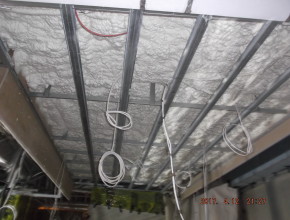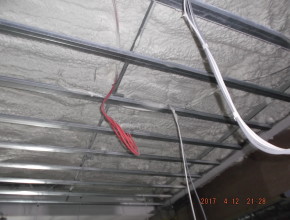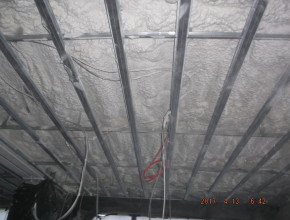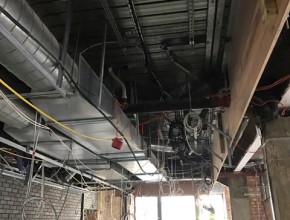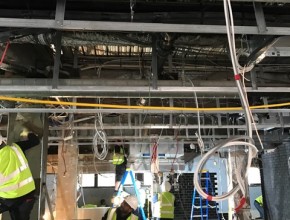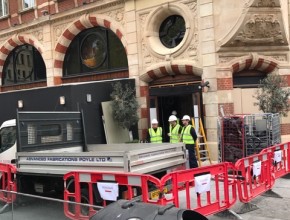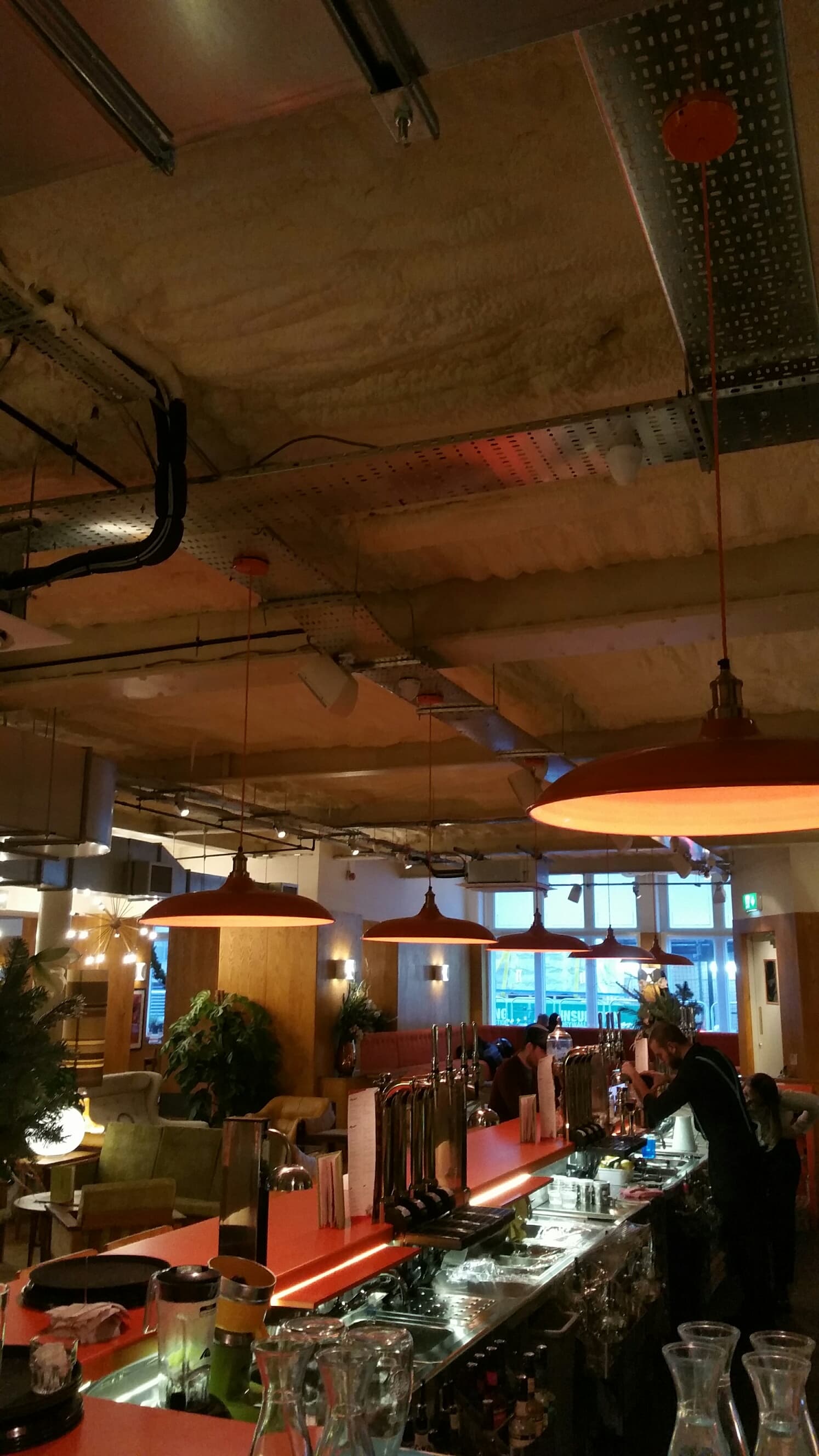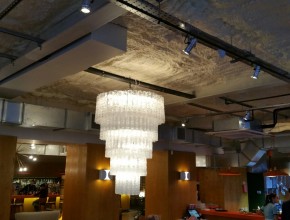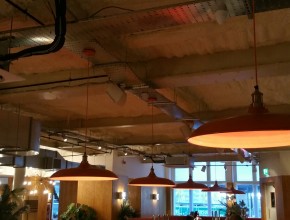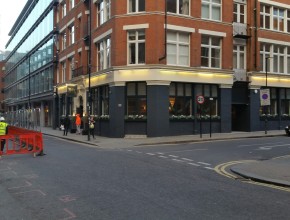Metropolitan Insulation recently completed sound insulation services at The Radisson Blu Edwardian Hampshire Hotel:
Soundproofing London
The price of a new roof will vary depending on several factors including the size of your roof and the materials used.
Common Soundproofing Myths
Like most other things in life that require a significant investment of cash to achieve, there are plenty of myths about how to save money on soundproofing. However, as we will show, most of them will only be partially effective at best.
Use egg cartons
One of the most common myths about soundproofing is that you can collect a load of egg cartons and use them to soundproof your walls. Using egg cartons for soundproofing will not only look unappealing they are likely to be completely ineffective because they won’t stop the transfer of energy through solid walls, which is what causes noise in the first place.
Hang some thick curtains
Having thick curtains will reduce sound coming through your windows as will double glazing but it won’t stop sound coming through walls and ceilings. To soundproof an interior, you will need to install soundproofing to all these areas.
Use mattresses
You often hear about cash strapped rock bands setting up their own recording studios using mattresses to sound proof walls. These can be partially effective in absorbing sound because they create that natural barrier and mass between sounds being emitted and walls. This kind of setup is only really a temporary fix as it unlikely you will get mattresses to shut out sound coming from all parts of the room.
Metropolitan Insulation Latest Project
Radisson Hotel Leicester Square
Pictures are from our latest project in the centre of London at the Radisson Hotel located in Leicester Square.
The ground floor is being refurbished prior to new fit out. We are spraying the ceilings here with 100mm low density open cell sound absorption polyurethane, manufactured and supplied from the United States.
This application will dramatically reduce airborne noise leakage from the communal bar and restaurant areas into the bedrooms above. All our products carry BBA certification and in this instance carry a Class 0 Fire Rating.
448m2 will be carried out in 48 hours. Airtight and clean, technology can help you too.
New Generation Of ‘Super Materials’…
…Have The Properties To Bend Sound Waves
There is a sense that we have only just begun to scratch the surface of 3D printing technology and it will no doubt end up being another giant leap forward in technology. One exciting area currently attracting a lot of interest in the press is the production of super materials that are able to bend sound waves and create audio hotspots.
This technology will not only help you get on better with your neighbours it could also revolutionise the sound insulation industry. 3D printing will play an important role in producing bricks the size of fingers that are then formed into a sheet which can control sound in a variety of different ways such as letting in sound at certain times of the day and keeping it out when the occupants of a building need a bit of peace and quiet.
The new super material referred to as meta-material which is finely engineered and produced using 3D printer technology. The material is designed for various purposes using a computer and this is then fed into the printer.
Each brick or slab that is produced by the printer has a labyrinth structure which forces sound waves to slow down as they enter.
Engineers have even produced plastic tubes using meta material which can be used to block out noise simply by pressing a button.
UK ‘must insulate millions of homes’
More than one home every minute will need to be refurbished in the UK between now and 2050, experts say.
The authors of a report to Parliament say 25 million existing homes will not meet the insulation standards required by mid-century.
The UK needs to cut carbon emissions by 80% by then – and a third of those emissions come from heating draughty buildings.
The government said it would devise policies as soon as possible.
But critics say ministers have been far too slow to impose a national programme of home renovation which would save on bills and improve people’s health, comfort and happiness. It would also create thousands of jobs.
Successive governments have been criticised for failing to tackle the UK’s poor housing stock – some of the worst in Europe.
Local authorities have limited cash to insulate council homes, and landlords and owner-occupiers have proved reluctant to invest large sums in disruptive improvements that will save on bills, but take many years to pay off.
The report from a group of leading construction firms – the Green Building Council – says four out of five homes that will be occupied in 2050 have already been built.
That means 25 million homes need refurbishing to the highest standards by 2050 – at a rate of 1.4 homes every minute.
Who pays?
The authors say this huge challenge also offers an unmissable opportunity under the government’s infrastructure agenda. The fiddly business of insulating roofs, walls and floors creates more jobs and has more benefits than any existing infrastructure priority, they maintain.
The question is how to pay. The government’s Green Deal scheme for owner-occupiers collapsed amid a welter of criticism that interest rates for insulation were too high, and that the insulation itself was too much hassle.
It says the construction industry needs certainty about what it is expected to deliver, and measurement to discover what is already being built. This should stimulate innovation, it says.
Julie Hirigoyen, head of the GBC, told BBC News there was a great prize to be grasped in upgrading building stock: “People will have warmer homes and lower bills; they will live longer, happier lives; we will be able to address climate change and carbon emissions.
“We will also be creating many thousands of jobs and exporting our best skills in innovation.
“Driving up demand for retro-fitting homes is essential for any policy to be a success – the Green Deal told us just offering financial incentives isn’t necessarily the only solution. We need to make it all easy, attractive and affordable.
“The good thing is that the business community is really starting to recognise the opportunity.”
How To Soundproof Doors
You may have a well-insulated home or office, but sometimes noise from outside is the problem and this can often be due to doors not having adequate sound insulation. Here’s how to fix the problem.
Soundproofing doors will have the additional benefit of improving insulation against draughts and it will also provide extra security besides providing sound insulation, so it is definitely worth investing in.
Soundproofing measures for doors should include draughtproofing to exterior doors as standard and if it’s a porch, install secondary double glazing. You can even install toughened glass which will contribute towards both sound insulation and security. When sound proofing doors, don’t forget to fill joints around the doors with acoustic sealant.
Sometimes noise can come from internal doors. In offices and apartment blocks noise will often be heard coming from corridors and so on so in these cases you will find similar benefits from draughtproofing.
Replacing old or lightweight hollow core doors with heavyweight solid core doors is also an option. These will help disrupt the transmission of noise between neighbouring flats for example.
If you are looking for advice and or help on soundproofing your home of office our experts are always happy to help.
A Quick Guide To Suspended Ceiling Soundproofing
If for one reason or another you don’t have access to a floor above to install sound proofing, then you could consider installing a suspended ceiling.
This can provide good sound insulation in flats, particularly those with high ceilings where the reduction in height is not an issue. IT has to be said howver that a suspended ceiling may only reduce the height of the room by less than 50mm.
Installing a suspended ceiling to insulate your room against sound will require acoustic mineral wool, which is highly effective against airborne sound and you will also need to separate the plaster ceiling from the joists above. This will provide protection against impact noise such as footsteps from above.
If you are experiencing noise from above, then you may also find that there is very little gap between the ceiling and the floor above. To increase the gap you can install resilient bars which can be screwed in right angles against the joists.
Before attempting to install a suspended ceiling, it is advisable to hire a specialist sound insulation company. The work can be messy, particularly when you are having to remove plasterboard and then install mineral wool between joists. If work isn’t done correctly you may even lose the natural soundproofing provided by the existing plasterboard.
Sound Insulation in Older Houses
Old houses can often be better insulated for sound than some new builds when it comes to the thickness of walls. Unfortunately, there will inevitably be some areas of the house that don’t provide adequate soundproofing such as old wooden floorboards.
Some people aren’t particularly bothered about hearing noise from footsteps above while for others this can cause distress over a period of time. If a house is being converted into a HMO for example the need to insulate between floors becomes even more important.
Before starting work, it is important to gain advice from an expert on sound insulation if you have no previous experience to ensure you are spending money wisely and on the right kind of sound insulation.
A common method for reducing noise in older houses is to install a false ceiling. Plaster ceilings are best left in place if you plan to do this because removing them is messy and unnecessary. The extra layer can even help add to the insulating properties.
If you have converted a loft, then acoustic matting can be an effective form of insulation when fitting a sub-floor would reduce the amount of headroom. It is worth spending extra on higher quality acoustic matting to ensure you get value for money.
Lesser Known Ways To Insulate Your Home
Whether it’s noise from a partially deaf neighbour who always has the TV on too loud at night or next door’s children learning to play the violin, noise can really impact on your quality of life over time. Fortunately, there are plenty of ways to insulate your house for sound. Here are some you may not have heard of.
Paint
If I was to tell you that a coat of paint would help supress noise you might think I was mad. To be exact though a good quality rendered external wall coating can be a good first step towards peace and quiet.
Wallpaper
You might think that wallpaper is just for decoration or feature walls but if it has the right properties, it can also contribute towards sound insulation. Thermal wallpaper not only helps insulate the home by keeping heat in, those same insulating properties can also insulate against sound coming from the other side of the wall.
Curtains
Thick curtains are making a comeback and that’s a good thing for anyone wanting to insulate their homes against noise.
Large pictures
Artwork can be something more than just something to admire. A large painting placed on the wall can provide a basis for an excellent buffer against sound coming from next door.
None of the above will eliminate noise problems, but at least they are a start. If you need further advice, please contact one of our experts.
Metropolitan’s Latest Installation
Metropolitan’s latest installation has been well received and a great success.
The site which is a very upmarket Scandinavian poultry restaurant, The Holy Birds is situated in Middlesex Street close to Tower Bridge.
The objective of the exercise was to reduce airborne noise to the flats above. Also the issue of reverberation
noise is combated. When the restaurant is full the noise generated is dissipated by our system.
This is another example of low density open cell acoustic foam being used successfully.
It can be left open as in this instance or covered up also. The product is BBA certified and can have a zero fire rating added
also.
Modern semi commercials like this benefit hugely from technology.

